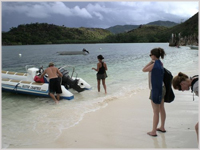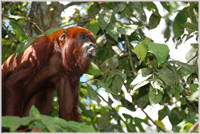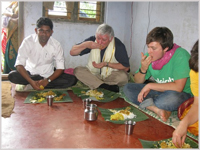 I’m standing in the warm waters of the Indian Ocean, on the beach of Praslin, watching for a small inflatable coming to take me across to the deserted Curieuse Island. As I wait, I ponder General Gordon’s claim that I’m actually standing in the original Garden of Eden. Today, tourist boards around the globe have turned ‘Eden’ into a hackneyed cliche, but to General Gordon’s Victorian eye there was clear evidence to back up his assertion. The versatile and nourishing breadfruit was clearly from the Tree of Life and the brazenly provocative coco-de-mer tree was without doubt The Tree of Knowledge – the fruit of which should on no account be eaten. (Reef conservation in the Seychelles with Global Vision International)
I’m standing in the warm waters of the Indian Ocean, on the beach of Praslin, watching for a small inflatable coming to take me across to the deserted Curieuse Island. As I wait, I ponder General Gordon’s claim that I’m actually standing in the original Garden of Eden. Today, tourist boards around the globe have turned ‘Eden’ into a hackneyed cliche, but to General Gordon’s Victorian eye there was clear evidence to back up his assertion. The versatile and nourishing breadfruit was clearly from the Tree of Life and the brazenly provocative coco-de-mer tree was without doubt The Tree of Knowledge – the fruit of which should on no account be eaten. (Reef conservation in the Seychelles with Global Vision International)
‘Always carry the two-way radio, the poison bite extraction kit and two litres of water and you should be alright.’ That was the first piece of advice expedition leader Peter Schuette gave on day one of my leopard and cheetah conservation project. Each morning we checking the box traps for overnight visitors but my group only managed to capture and release unwanted baboons, warthogs and a small but fearsome honey badger. (Protecting the big cats of Namibia with Biosphere Expeditions)
The red uakari monkeys are constantly on the move but we eventually find them or perhaps they find us. High up in the Amazonian tree canopy the troop stops to observe us, some turn their backs and show us their stumpy tails or maybe they’re mooning? Others come down for a closer look at the strange multicoloured terrestrial primate troop and a few lob sticks at us. (Amazonian rainforest survey with the Earthwatch Institute)
 These are a few of the conservation volunteering memories I’ve collected in the past few years. I enjoy travelling and suspect there’s something in our genes that urges us to find new places. Few of us would pass up an opportunity to see and experience new destinations but there’s more to travelling than simply going to different countries, there’s the question of how and why we travel?
These are a few of the conservation volunteering memories I’ve collected in the past few years. I enjoy travelling and suspect there’s something in our genes that urges us to find new places. Few of us would pass up an opportunity to see and experience new destinations but there’s more to travelling than simply going to different countries, there’s the question of how and why we travel?
We can travel as passive tourists organised by a tour company or as self-centred, hedonistic consumers or we can travel with a purpose – travel that can change you as well as the place you visit. What I love about volunteering is the way it gets you out of the tourist bubble and into the real world, whether that’s the rainforest, working with endangered animals or helping to develop sustainable livelihoods.
Wildlife has always fascinated me, I taught biology for many years, but there’s nothing like seeing an animal in its natural habitat. Sadly wildlife habitats are dwindling in every country on the planet – here in the UK just as in the far off Amazon.
Volunteering comes in all shapes and sizes and conservation volunteering is no different but there is no need to travel half way around the planet. Here in the UK there are plenty of opportunities; every UK county has a Wildlife Trust, engaged in important wildlife and environmental work right on our doorstep. The Royal Society for the Protection of Birds has wildlife reserves all around the country and is desperate for volunteer help. The Conservation Volunteers organise conservation holidays throughout the UK and the Irish Seal Sanctuary need volunteers to care for injured seals and other marine life.
 So here or abroad there are plenty of opportunities to help preserve endangered wildlife and protect the environment but volunteering abroad is a much bigger commitment and requires a lot more preparation. How do you choose where to go and what to do, which organisations are the most worthy, which are the safest and which would be the best option for you?
So here or abroad there are plenty of opportunities to help preserve endangered wildlife and protect the environment but volunteering abroad is a much bigger commitment and requires a lot more preparation. How do you choose where to go and what to do, which organisations are the most worthy, which are the safest and which would be the best option for you?
There are thousands of wildlife projects all around the globe and hundreds of organisations keen to organise everything for you. The colourful, effusive and ethically sounding websites of volunteer organisations might all appear to be similar – but they are not. There are some fabulously worthwhile opportunities but there are also companies that are simply travel agents jumping on the green bandwagon. But worse than that, there are fraudulent rackets that paint the same school building month after month, count the same turtles that a previous group counted and even those that rent village children for bogus tourist orphanage visits.
- Read Peter Lynch’s new book about wildlife & conservation volunteering trips.
Wildlife & Conservation Volunteering
(Bradt Travel Guides, 2012)
Article first published in Woman’s World, 2012











